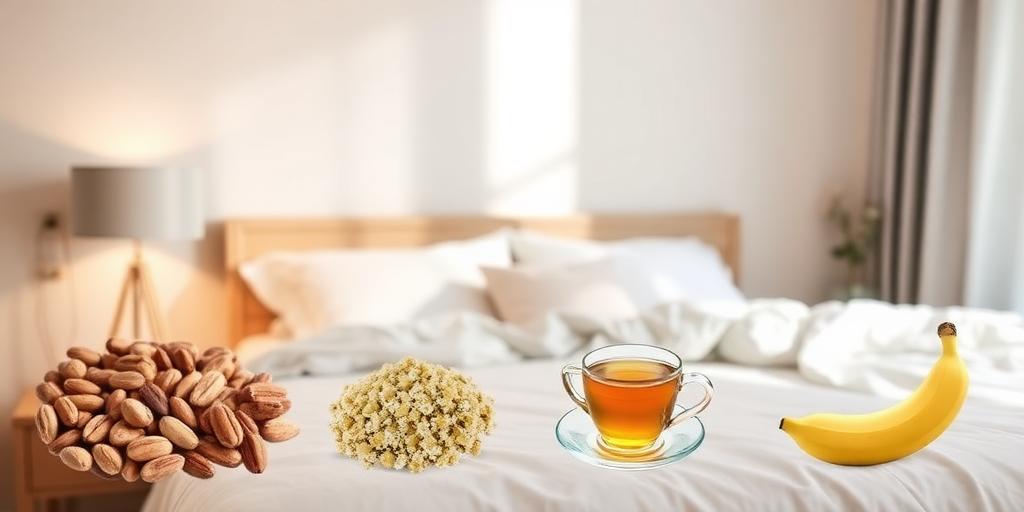Nutrition for Better Sleep Quality
Adequate sleep is crucial for overall health, affecting everything from cognitive function to immune response. While various factors influence sleep quality, nutrition plays a significant role. This post will explore how different nutrients and dietary habits can impact your sleep.
The Connection Between Food and Sleep
The food we consume affects our sleep patterns in several ways:
- Neurotransmitters: Certain foods contain amino acids that are precursors to neurotransmitters like serotonin and melatonin, which regulate sleep.
- Blood Sugar Levels: Imbalanced blood sugar levels can lead to sleep disturbances. Consuming high-sugar or heavily processed foods before bed can cause spikes and subsequent crashes, disrupting sleep.
- Hormone Regulation: Nutrients influence the production and regulation of hormones involved in the sleep-wake cycle.
Key Nutrients for Better Sleep
- Tryptophan:
- Role: An amino acid that the body converts into serotonin and melatonin.
- Sources: Turkey, chicken, nuts, seeds, tofu, and cheese.
- Recommendation: Combine tryptophan-rich foods with carbohydrates to enhance tryptophan absorption.
- Melatonin:
- Role: A hormone that regulates the sleep-wake cycle.
- Sources: Tart cherries, kiwis, nuts, and some types of mushrooms.
- Recommendation: Consider consuming melatonin-rich foods a few hours before bedtime.
- Magnesium:
- Role: A mineral that helps to relax muscles and nerves, promoting restful sleep.
- Sources: Leafy greens, nuts, seeds, whole grains, and dark chocolate.
- Recommendation: Incorporate magnesium-rich foods into your daily diet.
- Calcium:
- Role: Helps the brain use tryptophan to manufacture melatonin.
- Sources: Dairy products, fortified plant-based milk, leafy greens, and tofu.
- Recommendation: Consume calcium-rich foods in the evening to aid sleep.
- Complex Carbohydrates:
- Role: Promote the release of serotonin, which can help induce sleepiness.
- Sources: Oats, quinoa, brown rice, and sweet potatoes.
- Recommendation: Choose complex carbohydrates over simple sugars to avoid blood sugar spikes.
- Vitamin D:
- Role: While primarily known for bone health, Vitamin D also influences sleep regulation.
- Sources: Fatty fish, fortified foods, and sunlight exposure.
- Recommendation: Ensure adequate Vitamin D levels, especially during winter months.
Foods and Drinks to Avoid Before Bed
Certain foods and beverages can negatively impact sleep quality:
- Caffeine: A stimulant that can interfere with sleep onset and duration. Avoid coffee, tea, energy drinks, and chocolate close to bedtime.
- Alcohol: While it may initially induce drowsiness, alcohol disrupts sleep patterns later in the night.
- High-Sugar Foods: These can cause blood sugar spikes and crashes, leading to restless sleep.
- Spicy Foods: Can cause heartburn and discomfort, making it difficult to fall asleep.
- Large Meals: Eating a large meal right before bed can lead to indigestion and sleep disturbances.
Practical Tips for Better Sleep Through Nutrition
- Establish a Regular Eating Schedule: Consistency in meal times can help regulate your body's internal clock.
- Eat a Balanced Diet: Focus on whole foods, including fruits, vegetables, lean proteins, and complex carbohydrates.
- Limit Processed Foods: Reduce the intake of processed foods, sugary snacks, and unhealthy fats.
- Stay Hydrated: Drink enough water during the day, but limit fluid intake before bed to avoid nighttime awakenings.
- Consider a Bedtime Snack: If you're hungry before bed, opt for a small, sleep-promoting snack like a handful of nuts, a banana, or a cup of herbal tea.
Conclusion
Nutrition plays a vital role in promoting better sleep quality. By incorporating sleep-friendly foods into your diet and avoiding those that disrupt sleep, you can significantly improve your overall sleep experience. Experiment with different foods and habits to find what works best for you, and consult with a healthcare professional or nutritionist for personalized advice.









